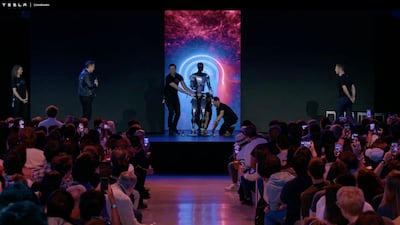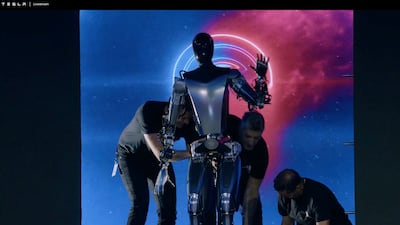The remarkable rise of artificial intelligence has demonstrated how times change rapidly in the brave new world of advanced technology.
If you cast your mind back to the early 2010s, the phrase 'There's an app for that' was so buzz-worthy it was trademarked by tech giants Apple.
Little more than a decade later and we may soon be saying 'there is an AI for that'.
OpenAI's ChatGPT has served as the poster child for an artificial intelligence revolution, in which more than 2,000 cutting-edge AI tools hitting the market in a matter of weeks.
Developments in AI are moving at breakneck speed and will no doubt change the way in which many of us work
Karl Escritt,
CEO of Like Digital & Partners
Its time-saving prompts captured headlines around the world, with other innovations including automated travel planning and machine learning to help medics sift through thousands of radiology scans for faster medical diagnostics.
While some industries are set to face more disruption than others, coding — the process of computer programming — is a skill that could be taken over by AI.
Cracking the code
Most people are confined to using the apps available on their phone, but now if you cannot find the app you want, you could just build it yourself.
Dom Monhardt, a technologist and designer used ChatGPT to write code to create his own personal banking app.
It is an example of how AI is opening access to once complicated skills and processes, he said.
“Generating code using ChatGPT was a magical moment,” said Mr Monhardt, a senior director of design at financial firm Tap Payments in Dubai.
“As a designer, I had never seen the process of writing code before so it was fascinating.
“I had some knowledge in development, but I was always unable to develop my own ideas.
“Working in banking, there were so many pain points and I was never able to cover the costs of development to work on my ideas.
“Now I just use the tool, it gives me the code back and I make my own app.”
Via his own personalised banking app, Mr Monhardt can keep track of all his transactions regardless of which bank he used.
This was done using the transaction SMS alerts sent by banks that were then transferred to a secure central database using a python script, a computer programming language used to build websites.
Mr Monhardt also developed an app that helps him craft more individual automatic responses to emails.
Other new public applications of AI include Agent GPT which plans and executes strategies such as how to set up a business, while Tripnotes takes the legwork out of planning a holiday by selecting the best places to visit and where to stay.
Krisp uses AI to eliminate background noise from an online video meeting and Gamma utilises the technology to created slide decks, presentations and websites.
$300 billion global spend
As more companies incorporate AI-centric systems into business operations, global spending on the technology is expected to reach $300 billion by 2026, according to International Data Corporation (IDC) analysts.
And as AI becomes more capable of performing labour intensive tasks, some jobs are likely to come under threat.
Fortunately, experts say a need for human input will remain.
“Developments in AI are moving at breakneck speed and will no doubt change the way in which many of us work in the near future,” said Karl Escritt, CEO of Like Digital & Partners, a Dubai agency that assists businesses in their digital transformation.
“It’s unlikely that highly skilled web development and coding jobs will be affected.
“Many tasks will become more automated with the further introduction of AI tools — debugging and testing, to name just a few."
Rise of AI - in pictures
The specs
Engine: Dual 180kW and 300kW front and rear motors
Power: 480kW
Torque: 850Nm
Transmission: Single-speed automatic
Price: From Dh359,900 ($98,000)
On sale: Now
Champions League Last 16
Red Bull Salzburg (AUT) v Bayern Munich (GER)
Sporting Lisbon (POR) v Manchester City (ENG)
Benfica (POR) v Ajax (NED)
Chelsea (ENG) v Lille (FRA)
Atletico Madrid (ESP) v Manchester United (ENG)
Villarreal (ESP) v Juventus (ITA)
Inter Milan (ITA) v Liverpool (ENG)
Paris Saint-Germain v Real Madrid (ESP)
RESULTS FOR STAGE 4
Stage 4 Dubai to Hatta, 197 km, Road race.
Overall leader Primoz Roglic SLO (Team Jumbo - Visma)
Stage winners: 1. Caleb Ewan AUS (Lotto - Soudal) 2. Matteo Moschetti ITA (Trek - Segafredo) 3. Primoz Roglic SLO (Team Jumbo - Visma)
The specs
Engine: 3.0-litre six-cylinder turbo
Power: 398hp from 5,250rpm
Torque: 580Nm at 1,900-4,800rpm
Transmission: Eight-speed auto
Fuel economy, combined: 6.5L/100km
On sale: December
Price: From Dh330,000 (estimate)
Five famous companies founded by teens
There are numerous success stories of teen businesses that were created in college dorm rooms and other modest circumstances. Below are some of the most recognisable names in the industry:
- Facebook: Mark Zuckerberg and his friends started Facebook when he was a 19-year-old Harvard undergraduate.
- Dell: When Michael Dell was an undergraduate student at Texas University in 1984, he started upgrading computers for profit. He starting working full-time on his business when he was 19. Eventually, his company became the Dell Computer Corporation and then Dell Inc.
- Subway: Fred DeLuca opened the first Subway restaurant when he was 17. In 1965, Mr DeLuca needed extra money for college, so he decided to open his own business. Peter Buck, a family friend, lent him $1,000 and together, they opened Pete’s Super Submarines. A few years later, the company was rebranded and called Subway.
- Mashable: In 2005, Pete Cashmore created Mashable in Scotland when he was a teenager. The site was then a technology blog. Over the next few decades, Mr Cashmore has turned Mashable into a global media company.
- Oculus VR: Palmer Luckey founded Oculus VR in June 2012, when he was 19. In August that year, Oculus launched its Kickstarter campaign and raised more than $1 million in three days. Facebook bought Oculus for $2 billion two years later.
Student Of The Year 2
Director: Punit Malhotra
Stars: Tiger Shroff, Tara Sutaria, Ananya Pandey, Aditya Seal
1.5 stars
Day 5, Abu Dhabi Test: At a glance
Moment of the day When Dilruwan Perera dismissed Yasir Shah to end Pakistan’s limp resistance, the Sri Lankans charged around the field with the fevered delirium of a side not used to winning. Trouble was, they had not. The delivery was deemed a no ball. Sri Lanka had a nervy wait, but it was merely a stay of execution for the beleaguered hosts.
Stat of the day – 5 Pakistan have lost all 10 wickets on the fifth day of a Test five times since the start of 2016. It is an alarming departure for a side who had apparently erased regular collapses from their resume. “The only thing I can say, it’s not a mitigating excuse at all, but that’s a young batting line up, obviously trying to find their way,” said Mickey Arthur, Pakistan’s coach.
The verdict Test matches in the UAE are known for speeding up on the last two days, but this was extreme. The first two innings of this Test took 11 sessions to complete. The remaining two were done in less than four. The nature of Pakistan’s capitulation at the end showed just how difficult the transition is going to be in the post Misbah-ul-Haq era.








